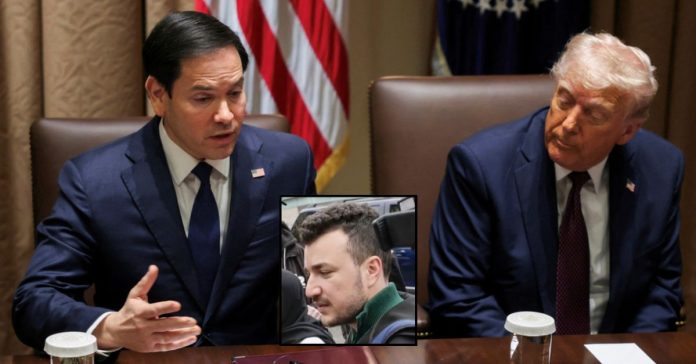
Inset: Mahmoud Khalil speaking to reporters (WCBS) Background: President Donald Trump listens as Secretary of State Marco Rubio speaks during a cabinet meeting at the White House in Washington, Monday, March 24, 2025 (Pool via AP).
A federal judge has declined to order the release of a Columbia University graduate student who was detained by immigration authorities earlier this year, despite living in the U.S. legally with a green card, saying he must present evidence and “prove” why his detention is causing him “irreparable harm” — even though it was “likely” unconstitutional, the judge says.
“He has not put before the court evidence as to the various other things he must prove,” said U.S. District Judge Michael Farbiarz in a Wednesday ruling out of New Jersey.
The American-Arab Anti-Discrimination Committee (ADC), along with co-counsel, is suing President Donald Trump and the Department of Homeland Security on behalf of Mahmoud Khalil, a 30-year-old who was detained on March 8 and is now facing deportation for what Homeland Security claims is a violation of Trump’s orders, which call for the removal of anyone deemed a “national security and public safety threat.”
A government memo obtained by NBC News said Khalil was told this by the Trump administration: “The Secretary of State has determined that your presence or activities in the United States would have serious adverse foreign policy consequences for the United States.”
His lawyers say the Trump administration has “unconstitutionally silenced” Khalil and others living in the U.S. from “speaking, hearing, or engaging with viewpoints critical of the U.S. government” through deportation and other means.
Khalil and two other plaintiffs claim they “fear government retaliation for engaging in constitutionally protected expression critical of U.S. foreign policy and supportive of Palestinian human rights.” This includes ceasing interactions with one another in public and isolating themselves, “fearing that their associations may draw scrutiny” and various punishments, their lawsuit says, including deportation and criminal prosecution.
Khalil has been in ICE custody in Louisiana since his arrest on March 8. His lawyers argue that the efforts to deport him violate his due process rights and should be “void for vagueness,” according to their March 17 motion for preliminary injunctive relief.
“The Petitioner is likely to succeed on the merits of this unconstitutional vagueness argument,” Farbiarz, a Joe Biden appointee, said Wednesday. “But this does not entitle him to a preliminary injunction.”
According to Farbiarz, while the government’s actions were “likely” unconstitutional — with Secretary of State Marco Rubio improperly using Trump’s statutes and “arbitrary enforcement” to detain him — Khalil still has to prove why he should be released before a final judgment is handed down. Farbiarz said he has not, so he will remain locked up for the time being.
“The Secretary’s determination deserves, and gets the highest respect,” Farbiarz explained. “But arbitrary enforcement can also be a danger, when one person is given the job, if his determination veers too far away from the standard set down by Congress. Here, the Secretary’s did.”
Farbiarz said the court would give Khalil’s lawyers and the government a chance to “weigh in” and respond to his order, which also included a ruling on claims made by Khalil’s team that he cannot be removed from the U.S. based on an allegation from the government that he allegedly failed to accurately fill out a lawful-permanent-resident application.
Khalil’s attorneys argued that the effort to remove him “flows from an allegedly unconstitutional policy established by the president and his senior advisors,” according to Farbiarz, but the judge said the argument was “not meaningfully developed.”

